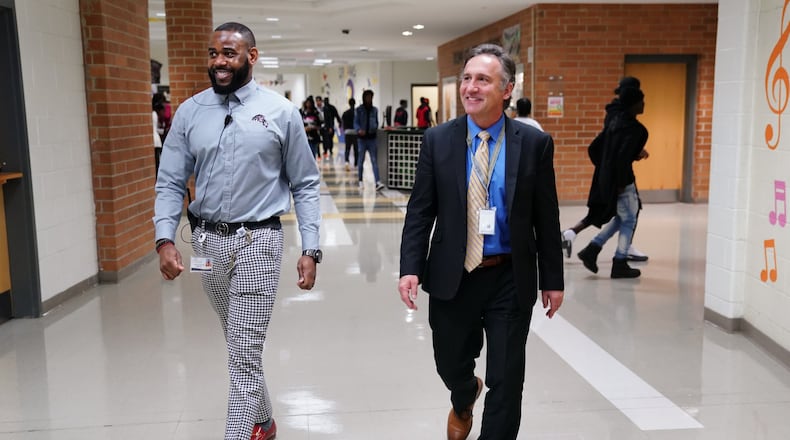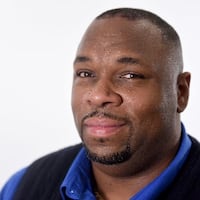Among the stops on Mike Looney’s calendar Dec. 13 was a visit to Langston Hughes High School in Fairburn.
He intended to meet briefly with some staffers and observe a classroom or two, a typical visit as he gets to know Fulton County Schools, where he’s been superintendent since the summer.
But his visit meant more to the staff at the south Fulton County school than he expected.
The counseling staff hit Looney with a deluge of information for nearly 90 minutes, covering their work to graduate students with both diplomas and associate degrees, strategies used for students retaking failed courses and getting more students interested in college.
At the beginning of the 90-minute slide presentation prepared ahead of Looney’s visit, lead counselor Hope Worrell said, “We’re excited for you to be here.”
It showed.
South Fulton County schools have long felt like the district’s stepchild. Located about an hour in Atlanta traffic from the district’s Sandy Springs headquarters, Fulton County’s southern schools include high populations of students of color and, historically, some of the district’s poor performers on standardized tests and student achievement, with lower graduation rates. The 21 schools that make up the South Learning Community are physically separated from the rest of the district by Atlanta Public Schools.
The region surfaced among Looney’s early priorities. He wanted the schools to feel they had a seat at the table. He even has an office in the South Learning Center headquarters, off Flat Shoals Road in Union City.
“They have to have a voice and they want to be acknowledged,” he said. “All our schools matter, and it shows them, too, through my actions.”
Those making the Langston Hughes presentation seemed to treat Looney’s visit as a once-in-a-lifetime opportunity to give a long-overdue update on their successes. Counselors talked about senior declaration day, where students announce which college they will attend, as well as the scholarship money they have received. Worrell said they invite lowerclassmen to the event to show how much scholarship money is available — and possible.
Students also are exposed to events held throughout the district, including a college fair at North Springs High School in Atlanta for Hispanic and Latino students, as well as a job fair for students who might forgo college after graduation.
“We don’t limit our students to what we do here,” Worrell said.
Looney engaged the group, questioning them about the need for buses as they expand the school’s dual-enrollment programs and how to get more students taking the ACT over the SAT college-entrance exam because, he said, the ACT better aligns with the state’s course of study. More students will continue to take the SAT because a Fulton County Schools program pays for some students to take the test, they told him.
“People are surprised by the types of questions I ask … and my willingness to engage,” Looney said.
Langston Hughes principal Charles Chester recalled Looney’s visit this past spring to Northwestern Middle School when Looney was announced as the district’s superintendent finalist. Chester was Northwestern’s principal until this summer. During the meeting, he said Looney was in his element, engaged and asking about as many questions as he received.
“I think that’s just who he is,” Chester said. “In order to move the district to the place he wants it to be, he is a very boots-on-the-ground type of person.”
Before he left Langston Hughes High, Looney also informed the counselors the district would be lowering its student-to-counselor ratio for better impact.
“We recognize how important y’all’s work is,” he told them.
Looney’s Southside office is sparsely populated with personal items. A picture and a painting — gifts from former students in his current and former school districts — sit on the desk. There’s a framed picture of his children on a book shelf at the front of the office near a small conference table.
He uses the office for several hours during the week, but he said his best work happens outside those walls.
“As you see, I move a lot,” he said, tinkering with a laptop to log into a meeting being held at the district’s Sandy Springs office.
After a few minutes, he’s on his feet again, this time off to the Fulton County Schools College and Career Academy. It’s much closer; he has only to walk past the South Learning Center’s front desk and through a set of double doors. There, he visits with students described to him as future educators, some others learning how to shoot and edit video.
When he gets to Johnny Pearson’s construction class, the students gather around a table saw for a quick lesson he had planned for them.
“You see?” he said, pointing to the end of his index finger, which is missing a chunk. “What did I do wrong?”
The students argued back and forth about the possibilities before Pearson pointed to the saw.
“He forgot the safety guard,” said Pearson, a 30-year educator in his second year at the school.
Pearson called Looney’s random visits both exciting and refreshing, for him and the students.
“He’s been in my room at least five times,” Pearson said. “I find it refreshing that someone at that level is able to come in and just make their presence known. It does great for the morale of the students. They always enjoy to see that level of leadership.”
Pearson said he noticed when he first got to the Fulton County school that his class was not as well equipped as a similar classroom at a school he saw on the district’s north side. Through Looney’s visits, the two have built a rapport. When Looney asks what Pearson needs for his program, Pearson said he’s not afraid to answer honestly. Looney’s presence also shows he’s committed to seeing south Fulton’s schools flourish.
“The interface tells us we can grow,” Pearson said. “We’re moving from the stepchild role and being brought into the family as a whole.
“We’re finally being shown there’s the same amount of love for us … like we’re part of the system now.”
About the Author
Keep Reading
The Latest
Featured



